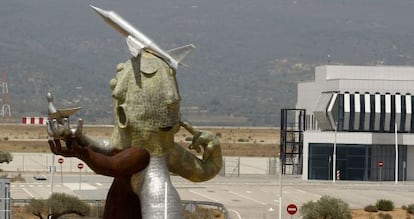Brussels to investigate subsidies at Castellón’s “airport with no planes”
Project that became symbol of Spain’s wasteful spending still under suspicion

Castellón’s notorious ghost airport, often held up as a prime example of Spain’s wasteful spending during the boom years of its economy, has come under investigation by Brussels shortly before it is scheduled to begin operating its first commercial flights.
The European Commission wants to know whether a multi-million-euro sum that the Valencian government agreed to pay Canadian group SNC-Lavalin for managing the airport complies with EU legislation, or whether it could in fact constitute illegal public subsidies. In May 2014 the regional government, then under Popular Party (PP) control, awarded management of Castellón-Costa de Azahar airport to the Canadian group, which took on the challenge of bringing air traffic to the isolated facilities in exchange for €24.5 million from Valencian authorities during the first nine years.
The EU also wants to know whether the Valencian government offered some kind of economic benefit to Ryanair
SNC-Lavalin was also exempt from paying a fee for the 20-year concession until a threshold of 1.2 million passengers a year is reached. The multinational, which will invest seven million euros in maintenance, does not expect to reach that kind of traffic until the year 2029.
The EU also wants to know whether the Valencian government, Castellón provincial authorities or the public corporation Aerocas worked with SNC-Lavalin to offer some kind of economic benefit to Ryanair, the only commercial airline that has announced it will be running regular flights to and from the airport.
The low-cost carrier said it will inaugurate routes to Castellón from London and Bristol on September 15. The EC will probe whether Ryanair received some kind of financial advantage that could create a market distortion.
The investigation has been slowed down by the change in government following the Spanish regional and municipal elections of May 24.
But sources at the Valencian executive admitted that the probe remains open.
“We are reviewing all the paperwork and will not offer an assessment until we have all the information,” said a source who works for the coalition government of Socialists and Compromís.
The airport was built by former Castellón provincial chief Carlos Fabra, who is now in jail for tax fraud
Another government source said that the PP-appointed members of the board of Aerocas, the public corporation that awarded the concession, resigned collectively on June 29 and that nobody warned their replacements that Brussels was on the case.
Built by former Castellón provincial chief Carlos Fabra, who is now in jail for tax fraud, the airport was officially opened in March 2011 but remained inoperative until 2014 because it lacked all the necessary licenses.
Although the project was due to be built by the private sector, the Valencia government ultimately had to pay out €120 million for construction work, plus an additional €50 million in compensation, cost overruns and external work.
When Spain became mired in a deep economic crisis, the plane-less airport was featured in numerous international news reports about reckless public spending during the boom years.
Tu suscripción se está usando en otro dispositivo
¿Quieres añadir otro usuario a tu suscripción?
Si continúas leyendo en este dispositivo, no se podrá leer en el otro.
FlechaTu suscripción se está usando en otro dispositivo y solo puedes acceder a EL PAÍS desde un dispositivo a la vez.
Si quieres compartir tu cuenta, cambia tu suscripción a la modalidad Premium, así podrás añadir otro usuario. Cada uno accederá con su propia cuenta de email, lo que os permitirá personalizar vuestra experiencia en EL PAÍS.
¿Tienes una suscripción de empresa? Accede aquí para contratar más cuentas.
En el caso de no saber quién está usando tu cuenta, te recomendamos cambiar tu contraseña aquí.
Si decides continuar compartiendo tu cuenta, este mensaje se mostrará en tu dispositivo y en el de la otra persona que está usando tu cuenta de forma indefinida, afectando a tu experiencia de lectura. Puedes consultar aquí los términos y condiciones de la suscripción digital.








































